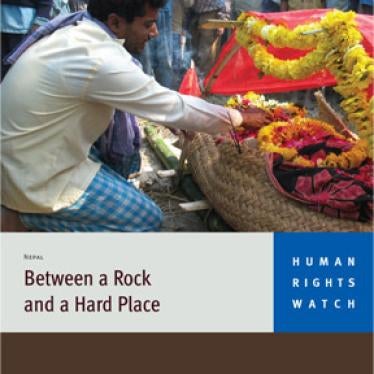(London) - New conditions on U.S. military assistance to Nepal require fundamental changes in the way the Nepali security forces deal with human rights, Human Rights Watch said today.
The new conditions were passed by Congress and have now been signed into law by President George W. Bush.
“This legislation is a crucial step forward for human rights protection for Nepalis,” said Brad Adams, Asia director of Human Rights Watch. “The security forces operate with almost total impunity and thus far have had the unqualified support of the United States. Now they know that they have to clean up their act if military assistance--and the political support that goes along with it--is going to continue.”
It will be important for the United States to monitor whether the provisions of the new law are implemented, and to intervene with Nepali authorities when abuses occur.
Human Rights Watch and others have documented systematic abuses by government forces, including extrajudicial executions, large numbers of "disappearances," torture, and arbitrary arrests. The United States is a major provider of military assistance to Nepal as part of Nepal’s civil war against the Communist Party of Nepal (Maoist).
In a September report, "Between a Rock and a Hard Place: Civilians Struggle to Survive Nepal’s Civil War", Human Rights Watch documented government and Maoist abuses. The report showed how government security forces regularly “disappear” and execute suspected Maoists. The security forces routinely ignore habeas corpus orders from the Supreme Court ordering access to detainees, and repeatedly lie to the Supreme Court
about the whereabouts of detainees in its custody. Moreover, the government also fails to investigate and prosecute almost all cases of abuses by security forces, effectively allowing soldiers free reign to commit abuses and fostering a culture of impunity.
The new U.S. law addresses these problems by conditioning future military assistance on Nepali government action to:
• take effective steps to end torture by security forces and to prosecute members of such forces who are responsible for gross violations of human rights;
• determine the number of and make substantial progress in complying with habeas corpus orders issued by the Supreme Court of Nepal, including all outstanding orders;
• cooperate with the National Human Rights Commission of Nepal to identify and resolve all security related cases involving individuals in government custody; and
• grant the National Human Rights Commission of Nepal unimpeded access to all places of detention.
The law contains a clause allowing the waiver of these conditions if the Secretary of State determines that it is in the national security of the United States to do so.
“The government of Nepal has to take these conditions very seriously”, said Adams. “Instead of defending their behavior, the government and the security forces should see this as an opportunity for much needed reform and a chance to reach out and regain the trust of the people. Nepal can show that fighting an insurgency need not amount to an assault on the basic human rights of the very people they claim to protect.”
Human Rights Watch noted that the passage of these provisions has already led to an unprecedented visit by the army chief of staff to the Supreme Court and the National Human Rights Commission, during which he promised to comply with habeas corpus orders of the court and to cooperate with investigations of the NHRC.
But Human Rights Watch pointed out that the security forces and the government have a vested interest in feigning compliance with the new law. In the absence of careful monitoring by the U.S. government, these conditions may become little more than a cosmetic gesture.
“Because of their close relationship, the United States has a great deal of influence over the Nepali army,” said Adams. “It is crucial for the United States to continuously put pressure on the Nepali government to respect human rights. In monitoring compliance with the new legislation, U.S. officials should not only consult with the army, police, and
government, but should also be in regular contact with a broad range of civil society actors, including independent authorities such as the National Human Rights Commission.”
Human Rights Watch welcomed the law’s condemnation of Maoist human rights abuses, which include summary executions, torture, and extortion. The law called on other countries to denounce Maoist atrocities. In a recent report, Human Rights Watch documented Maoist atrocities, including summary executions, torture, cruel and inhumane treatment, and persecution based on political persuasions. Human Rights Watch has also documented the intensely undemocratic culture of the Maoists which has generated a culture of fear and silence throughout the remote countryside.
“The Maoists receive no international support, so there is less leverage that can be applied to them,” said Adams. “But it is important for the Maoists to understand that condemnation and scrutiny of the government’s human rights record is in no way a signal of support for the Maoists. Their human rights record is disgraceful and needs fundamental change for anyone to take them seriously as a political entity.”






